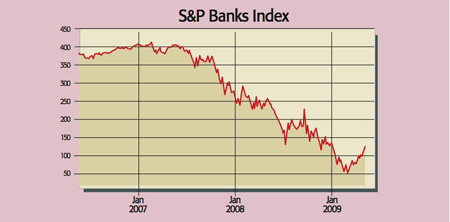Get the latest financial news, insights and expert analysis from our award-winning MoneyWeek team, to help you understand what really matters when it comes to your finances.
You are now subscribed
Your newsletter sign-up was successful
Want to add more newsletters?

Twice daily
MoneyWeek
Get the latest financial news, insights and expert analysis from our award-winning MoneyWeek team, to help you understand what really matters when it comes to your finances.

Four times a week
Look After My Bills
Sign up to our free money-saving newsletter, filled with the latest news and expert advice to help you find the best tips and deals for managing your bills. Start saving today!
"Most students suffer from pre-exam nerves. But the financial markets were remarkably sanguine ahead of the results of the stress tests of American banks," says The Economist. As the Federal Reserve announced the results of its assessment of 19 large financial institutions' ability to withstand loan losses over the next two years, the S&P 500 had already regained all the ground they had lost in 2009. The following day, it rallied further.
The test results were mixed, but investors seemed to find them positive, says Anthony Currie on Breakingviews; at least the risk of a large bank failing seems to be "off the table". But Bank of America was ordered to raise a fresh $34bn in capital, Citigroup to raise $5.5bn and Wells Fargo $13.7bn, amounting to 25%-50% of their capital. Four regional banking groups Fifth Third, Keycorp, Regionals Financial and Suntrust were told to raise comparable amounts relative to their smaller size. Most other banks got off virtually unscathed, although GMAC the finance arm of GM is "staring nationalisation in the face" after being told to more than double its existing $11.1bn capital base.

But is any of this meaningful? Certainly, it involves "enough assumptions to make an investor's head spin", says Lex in the FT. Assumptions over the economy, assumptions over loss rates, assumptions over future earnings (which were challenged by at least four banks who claimed the Fed was being too harsh) and assumptions on asset disposals and other transactions. Some of these "are not stressful enough" to be a real worst-case scenario, says berbear Nouriel Roubini: specifically, "unemployment rates are already higher than assumed".
MoneyWeek
Subscribe to MoneyWeek today and get your first six magazine issues absolutely FREE

Sign up to Money Morning
Don't miss the latest investment and personal finances news, market analysis, plus money-saving tips with our free twice-daily newsletter
Don't miss the latest investment and personal finances news, market analysis, plus money-saving tips with our free twice-daily newsletter
On the other hand, there are now factors working in the banks' favour, says Jan Hartzius of Goldman Sachs, who was one of the most bearish analysts early in the crisis. We can see that most of the remaining losses will be in the banks' loan books, as opposed to the securities losses that "overwhelmed" them in 2008. These losses will be recognised over time; thus the effects shouldn't be as "violent" as the last set of write-downs, which occurred when securities had to be 'marked to market'. Overall, the tests "deserve a B-minus", says Peter Eavis in The Wall Street Journal. While they give us a little more insight, some banks "seem to have got off lightly". There is still "reason to be sceptical".
Get the latest financial news, insights and expert analysis from our award-winning MoneyWeek team, to help you understand what really matters when it comes to your finances.
MoneyWeek is written by a team of experienced and award-winning journalists, plus expert columnists. As well as daily digital news and features, MoneyWeek also publishes a weekly magazine, covering investing and personal finance. From share tips, pensions, gold to practical investment tips - we provide a round-up to help you make money and keep it.
-
 Early signs of the AI apocalypse?
Early signs of the AI apocalypse?Uncertainty is rife as investors question what the impact of AI will be.
-
 Reach for the stars to boost Britain's space industry
Reach for the stars to boost Britain's space industryopinion We can’t afford to neglect Britain's space industry. Unfortunately, the government is taking completely the wrong approach, says Matthew Lynn

